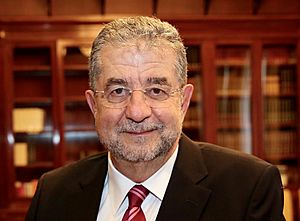José Antonio Pascual facts for kids
Quick facts for kids
The Most Excellent
José Antonio Pascual
|
|
|---|---|
 |
|
| Born | 29 March 1942 |
| Nationality | Spanish |
| Alma mater | Universidad de Salamanca |
| Occupation | professor, linguist |
|
Notable work
|
Diccionario crítico etimológico castellano e hispánico, Hablando claro |
| Title | Professor at Charles III University of Madrid, Accademia della Crusca, Institut d'Estudis Catalans |
| Awards | Caballero de las Artes y las Letras, Premio Nacional de Investigación Ramón Menéndez Pidal (2006) |
| Seat k of the Real Academia Española | |
| Assumed office 10 March 2002 |
|
| Preceded by | Rafael Lapesa |
José Antonio Pascual Rodríguez was born on March 29, 1942, in Monleras, Spain. He is a very important expert in languages, known as a linguist. He also teaches Spanish at the Charles III University of Madrid.
He is a member of two very important groups that help keep languages correct: the Royal Spanish Academy for Spanish and the Accademia della Crusca for Italian.
Contents
A Life of Words
What is a Linguist?
A linguist is someone who studies language. They look at how languages are built, how they change over time, and how people use them. José Antonio Pascual has spent his life studying the Spanish language.
Helping the Spanish Language
José Antonio Pascual joined the Royal Spanish Academy in 2002. This academy is a very old and respected group in Spain. Its job is to make sure the Spanish language is used correctly. From 2007 to 2015, he was the vice president of this important academy.
He also belongs to the Accademia della Crusca, which does a similar job for the Italian language.
Important Works
One of his most famous works is a huge dictionary called Diccionario crítico etimológico castellano e hispánico. He worked on this with another expert, Joan Coromines. This dictionary explains where Spanish words come from and how they have changed over many years. It was published between 1983 and 1991.
José Antonio Pascual also helped create a television series called Hablando claro. This show, which aired in Spain in the late 1980s, helped people understand more about the Spanish language in a clear and easy way.
Images for kids
See also
 In Spanish: José Antonio Pascual para niños
In Spanish: José Antonio Pascual para niños
 | Sharif Bey |
 | Hale Woodruff |
 | Richmond Barthé |
 | Purvis Young |


